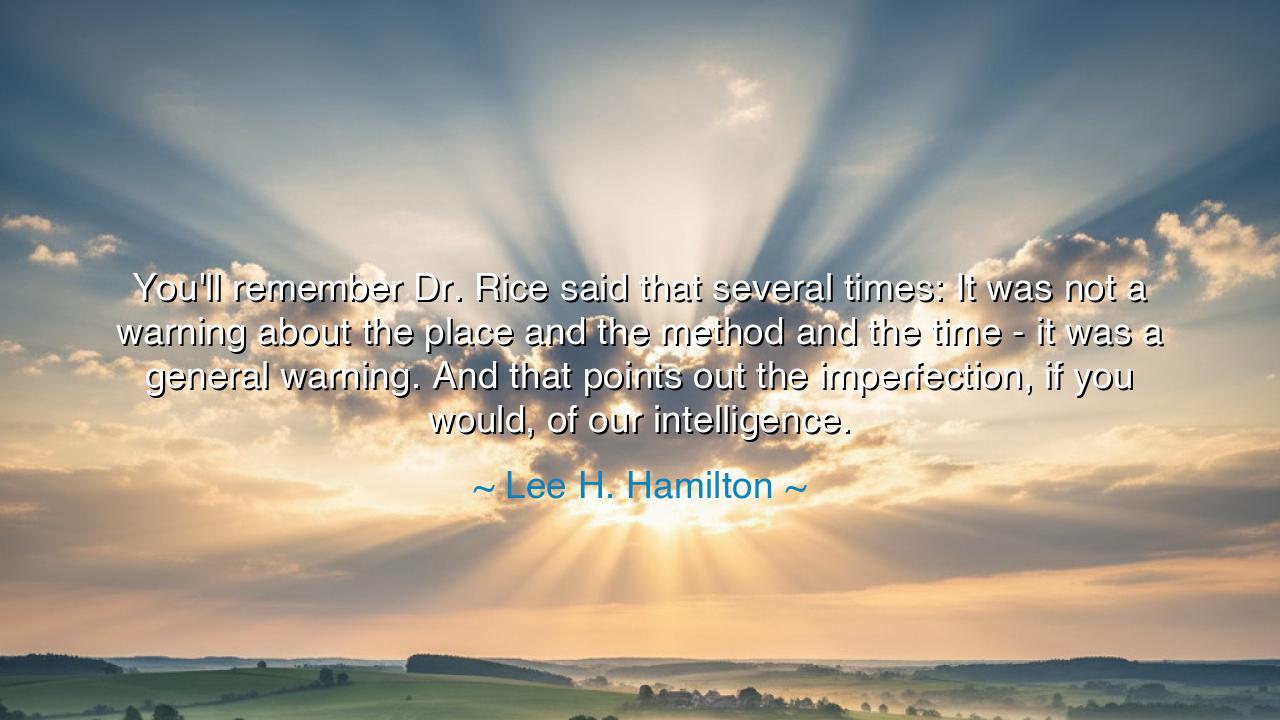
You'll remember Dr. Rice said that several times: It was not a
You'll remember Dr. Rice said that several times: It was not a warning about the place and the method and the time - it was a general warning. And that points out the imperfection, if you would, of our intelligence.






In the reflective words of Lee H. Hamilton, "You'll remember Dr. Rice said that several times: It was not a warning about the place and the method and the time - it was a general warning. And that points out the imperfection, if you would, of our intelligence," we are reminded of the profound limitations inherent in human understanding and foresight. Hamilton, in referencing Dr. Rice, highlights a moment when the mind’s greatest effort to predict or prevent an outcome is thwarted not by lack of information, but by the very imperfection of the human mind itself. Despite all the intelligence, preparation, and warnings, the mind remains fallible, and the true danger lies not in the details we may get wrong, but in the overarching blindness to larger truths that we fail to see.
This echoes the ancient wisdom shared by the Greeks, who, in their philosophical musings, often examined the limits of human knowledge. Socrates famously declared, "I know that I know nothing," a statement that recognizes the boundless nature of wisdom and the endless ways in which the human mind falls short. The very attempt to know everything—to predict every detail of the world—is in itself an acknowledgment of human imperfection. This humble understanding leads us to deeper truths, as Socrates suggested, that wisdom begins with the recognition of how little we truly know. For as Lee H. Hamilton points out, even the best efforts at forecasting events or outcomes are not infallible due to our limited intelligence.
The story of King Oedipus in Greek tragedy serves as a poignant illustration of this concept. Oedipus, a king who sought to rid his city of a curse, sought knowledge through his intelligence and determination, only to discover that the answers he sought were already written in his fate. Despite all his wisdom, the prophecy came true, revealing that human intelligence, no matter how well-intentioned, often fails to see the broader truths of existence. His story teaches that we can never fully predict the future, and that our understanding is often incomplete, shaped by the biases and constraints of our own limited perspective.
Hamilton’s reflection on the imperfection of intelligence brings us to a core lesson: that human intelligence—while powerful—is not an omnipotent force. It is subject to the errors of perception, the biases of experience, and the limits of understanding. In the face of great challenges, we may have all the necessary data, yet the unknowns remain hidden from us. This speaks to the need for humility in our approach to both knowledge and action. We must acknowledge that there are always forces and factors beyond our comprehension, and that our very effort to control and predict the world will always be incomplete.
Consider the example of Winston Churchill during World War II. Despite his brilliance and steadfast leadership, there were moments when even Churchill’s intelligence and foresight could not prevent the tides of war from sweeping over Europe. There were missteps, unforeseen challenges, and moments of failure, yet Churchill understood that intelligence is not about perfection but about how one responds to imperfection. It is in accepting our limitations and moving forward with clarity, courage, and determination that true leadership is tested.
The lesson from Hamilton’s words and the wisdom of the ancients is clear: we must approach both our goals and our failures with humility. We must recognize the imperfection of our intelligence and the inevitable uncertainty of life. The true test is not in achieving perfection or having all the answers, but in our ability to adapt, to learn from mistakes, and to keep striving for greater understanding even when the path is unclear. As Socrates might remind us, the true mark of wisdom is not in knowing all things but in accepting that we can never know everything.
Thus, the practical action we must take in our lives is to embrace uncertainty. Rather than be discouraged by the inevitable gaps in our knowledge, we should view them as opportunities for growth and learning. When faced with challenges or the unknown, we must remember that imperfection is not a flaw but a fundamental part of the human experience. Let us not fear it, but use it to drive us toward greater wisdom, resilience, and compassion. In doing so, we come to understand that intelligence, at its highest form, is not about achieving certainty but about thriving amidst the uncertainty of life.






AAdministratorAdministrator
Welcome, honored guests. Please leave a comment, we will respond soon